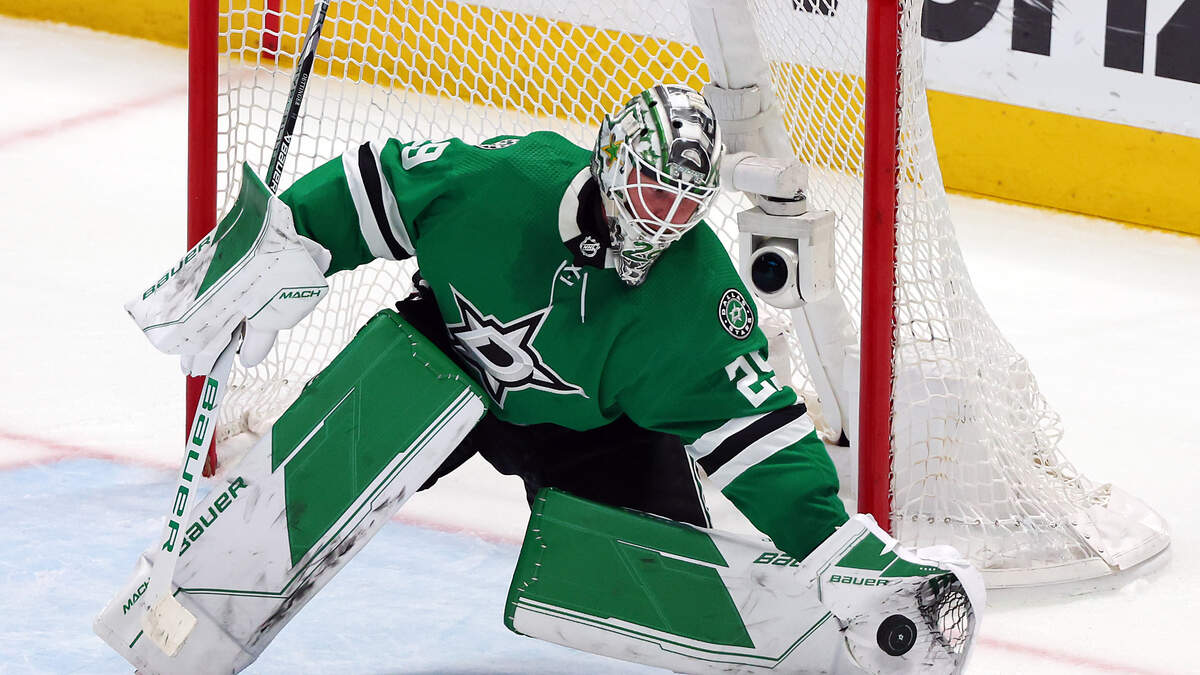In the high-stakes world of professional hockey, where moments define careers and legacies, one Dallas Stars goaltender is choosing to view a recent, painful setback not as a defeat, but as a future punchline. Jake Oettinger, the stoic presence between the pipes, harbors a unique ambition: to someday laugh about the playoff exit that left him on the bench, an indelible mark on a season that promised so much.

A Playoff Moment That Stung
The scene is etched into the memory of every Dallas Stars fan: Game 5 of the Western Conference Final. Facing elimination against the formidable Edmonton Oilers, Oettinger, the team`s anchor, was pulled just over seven minutes into the game after allowing two goals on the only two shots he faced. It was a swift, brutal decision by then-coach Pete DeBoer, designed to ignite a spark, but instead, it left a raw, open wound on the collective psyche of the team and its netminder.
For a goaltender, being pulled from such a pivotal game is akin to an artist having their masterpiece snatched from the easel mid-stroke. It’s a public declaration of underperformance, a strategic gamble that, in this instance, failed to pay off in the short term, leading to a 6-3 loss and the end of the Stars` season.
The Coach`s Rationale and its Aftershocks
DeBoer`s rationale was rooted in a strategic desperation: Oettinger had, indeed, struggled against the Oilers, losing six of his previous seven playoff encounters with them over two seasons. The coach sought a jolt, a psychological reset for a team teetering on the brink. What transpired, however, extended beyond the ice. The immediate aftermath saw a noticeable strain, a silence between player and coach that spoke volumes, even if later downplayed as a mere “blown out of proportion” incident.
This dynamic, the high-pressure decision-making of a coach colliding with the immense pride of an elite athlete, is a recurring narrative in professional sports. The stakes are so high, the margins so thin, that perceived missteps can unravel seasons and, occasionally, cost coaches their jobs. Eight days after the season ended, DeBoer was indeed fired, a decision general manager Jim Nill noted was not solely due to the Oettinger incident, but undoubtedly influenced by the cumulative effect of three consecutive conference final exits.
Oettinger`s Long-Game Perspective: Turning Pain into Progress
Yet, from the ashes of this disappointment, Oettinger emerges with a remarkably composed, long-term vision. He views the incident not as a scar, but as a crucible—a necessary trial by fire that will, he believes, ultimately forge him into a Stanley Cup champion.
“In the long run, I feel like I`m gonna look back on it as something that helped me,” Oettinger stated recently. “And when we do win it all, it’s going to be, you know, look back and laugh and feel like that was something I had to go through in order to get to that.”
This perspective is a hallmark of truly elite athletes: the ability to reframe adversity, to extract lessons from failure, and to weaponize perceived weaknesses into future strengths. It speaks to a profound mental fortitude, an understanding that the journey to greatness is rarely linear or painless. The “laugh” Oettinger envisions is not born of casual dismissal, but of hard-won triumph, a testament to overcoming a moment that could have defined his career in a far more somber light.
The Weight of a Commitment: A Top-Tier Goalie`s Burden
Oettinger carries not just the hopes of his team, but the weight of an eight-year, $66 million contract extension that recently kicked in. This commitment underscores his value to the Stars, who drafted him 26th overall in 2017, alongside foundational players like Miro Heiskanen and Jason Robertson. His career numbers—a 149-66-27 record with a .912 save percentage and 2.52 GAA in 251 regular-season games—solidify his status as one of the league`s premier goaltenders.
Such a contract brings immense pressure, but also immense trust. Teammates, like trade deadline acquisition Mikko Rantanen, echo the sentiment of confidence: “He`s, I think, a top-three goalie in the league for sure. That`s a big advantage to have a goalie whom you can trust. And he works hard off the ice. You know he wants to get better, which is really good also.” This belief from within the locker room is crucial for a player whose confidence is paramount to his performance.
Moving Forward: The Pursuit of the Ultimate Prize
DeBoer, in his first public comments since his dismissal, articulated his own regret: not for the decision to pull Oettinger, but for how he handled the post-game narrative. He acknowledged that the blame for the team`s shortcomings lay with everyone, from coaches to players to the organization as a whole, a sentiment Oettinger respectfully endorsed. This public alignment, however belated, might serve as a form of closure, allowing both parties to move forward.
As the Dallas Stars embark on another season, the memory of that Game 5 remains a potent motivator. Oettinger`s ambition to “laugh about it” is more than just an optimistic outlook; it`s a declaration of intent. It signifies a profound belief in his own abilities, a steely resolve to transform a moment of professional vulnerability into a foundational piece of a future championship narrative. For the Stars, and for their resilient goaltender, the ultimate validation will only come when they hoist the Stanley Cup, making that Game 5 incident a distant, almost humorous, footnote in a triumphant legacy.

